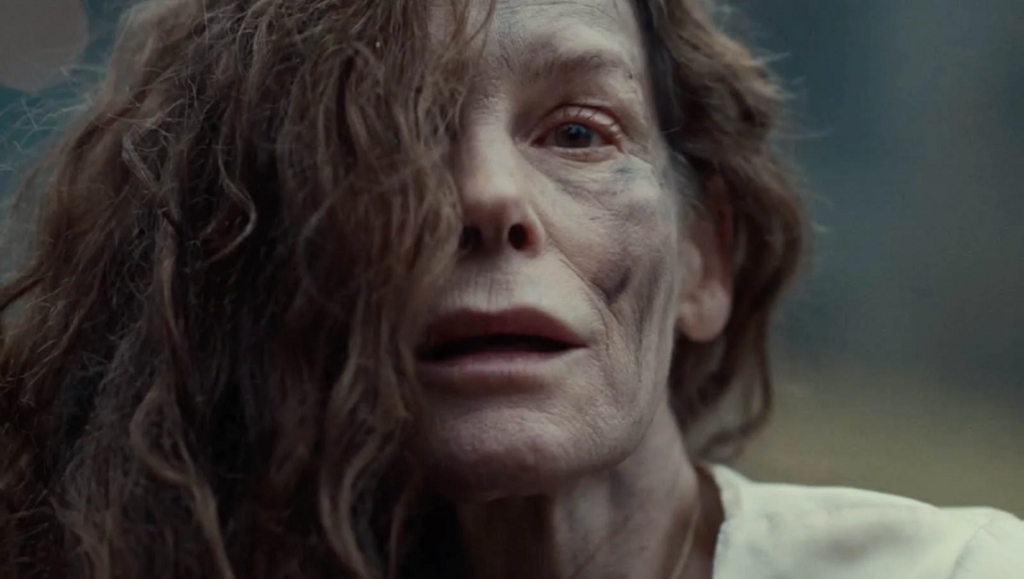She Will offers plenty of appealing phantasmagoria, but skews too indulgent with its visual design and often upsets its rhythms with a need to preach.
For the past 30 years, actress Alice Krige has made a career out of memorable supporting turns in various horror and sci-fi flicks, popping up in everything from Stephen King’s Sleepwalkers to Star Trek: First Contact to the recent Hansel and Gretel: Witch Hunters. While the films themselves may vary in quality — sometimes wildly so — Krige’s command of the medium is never in doubt, her steely determination cutting through the morass like a freshly sharpened machete through flesh. Indeed, it is Krige’s impeccable austerity — and the ways in which the seasoned pro wields it — that lends her characters hidden dimension, inner strength that hints at something both profound and, in most cases, deeply sinister. These qualities get quite the workout in Krige’s latest project, She Will, which finds the actress in a rare and welcome leading performance. One simply wishes the movie itself was more than just another middling entry in the already exhausted mode of “elevated horror.”
Writer-director Charlotte Colbert and co-writer Kitty Percy have fashioned a topical tale of female empowerment that goes nowhere particularly surprising — and is in no hurry to get there, either. Krige stars as Veronica Ghent, an aging film actress recovering from a recent double mastectomy. With personal nurse Desi (Kota Eberhardt) in tow, Veronica travels to a secluded retreat in the mountains of the Scottish Highlands, where she hopes to recover far from the watchful eye of the paparazzi, all of whom have renewed interest in the actress since the recent announcement of a remake of her landmark film, Navajo Frontier, which she shot when she was just 13 and is being helmed by the same director, Eric Hathbourne (Malcolm McDowell), with whom Veronica has a troubled history. Unfortunately for Veronica, not only are her plans for solitude derailed by a large group of crystal-worshipping New Age hippies who have booked the estate for the same week, but the hotel itself has been built on ancient grounds that witnessed the brutal murder of over 3,000 women who had been accused of witchcraft, with locals often proclaiming the site to be haunted. It doesn’t take long before Veronica starts having a series of startling and horrific dreams that may or may not be real, allowing her to exact revenge on those men who have done her wrong.
In setup, She Will is as creaky as the trees that surround our protagonist’s guest quarters, the novelty promised both thematically and through filmmaking prowess. Colbert is a visual storyteller above all else, her hallucinatory imagery capturing the hellish psychological torture that Veronica has been forced to endure for nearly her entire life, made physical by a recent operation that has robbed her of both a physical and cultural signifier of femininity. She Will is ultimately the story of a woman clawing for and finding resilience, and seeking vengeance on those men who opt to oppress any woman who shows the least bit of agency, so threatening it is to their own pathetic masculinity. Unfortunately, Colbert opts for the same beautifully rendered yet cliched imagery over and over. And over. And then over once more for good measure. Aerial drone shots of the woods, the camera floating high above, occasionally bobbing and weaving like a spirit tethered to the land; thick black mud, oozing its way across the forest floor; twisting orbs of fire; 18th-century women adorned in dresses of burlap sacks and metal head gear that forcefully clamps their lips together, the robbing of the female voice made literal; slugs provocatively intertwined in various stages of mucused debauchery, dripping a viscous, semen-like fluid. There are times when these visuals — especially when accompanied by the appropriately creepy score by the great Clint Mansell (yes, there are children chanting) — bring to mind the late work of George P. Cosmatos, not only in the surrealistic and unsettling imagery itself, but in its overall purpose, one that goes beyond the basics of storytelling and characterization. Colbert is, more than anything, after a vibe, one that specifically attempts to capture what it feels like to be a woman robbed of her agency and then, later, the freedom in finding it again — but also, you know, creepy, because this is a horror flick.
And this ultimately proves to be the film’s biggest issue: it’s so concerned with the message it’s selling, as well as basic plot mechanics, that it’s unable to maintain the fantastical, phantasmagoric state it repeatedly introduces, stopping dead in its tracks so that a male character can say something misogynistic, or so Veronica can state outright her feelings at that exact moment. Krige, unsurprisingly, is fantastic in the lead role, given the rare opportunity to chew quite a bit of scenery in the early going, and clearly relishing the opportunity. Indeed, there is not a lot of subtlety to be found, and none is required of its cast members. Tonally, things become a bit messier, with the crystal-worshipping hippies especially puzzling, often giving the impression that they’ve been ported in from a Monty Python sketch. It doesn’t help that the various actors and actresses within this section are community theater-level bad, including, shockingly enough, Rupert Everett, who one has to assume is performing a favor to take on a role this dire. She Will certainly gets points for topicality, as well as actively advocating sisterhood instead of lazily pitting its female characters against one another, but it’s ultimately too self-consciously artsy for the mainstream crowd, and too mainstream for those who prefer their horror with a side of artsy. Here’s hoping it at least inspires more leading roles for Krige, who proves she has the will and skill for them.


Comments are closed.